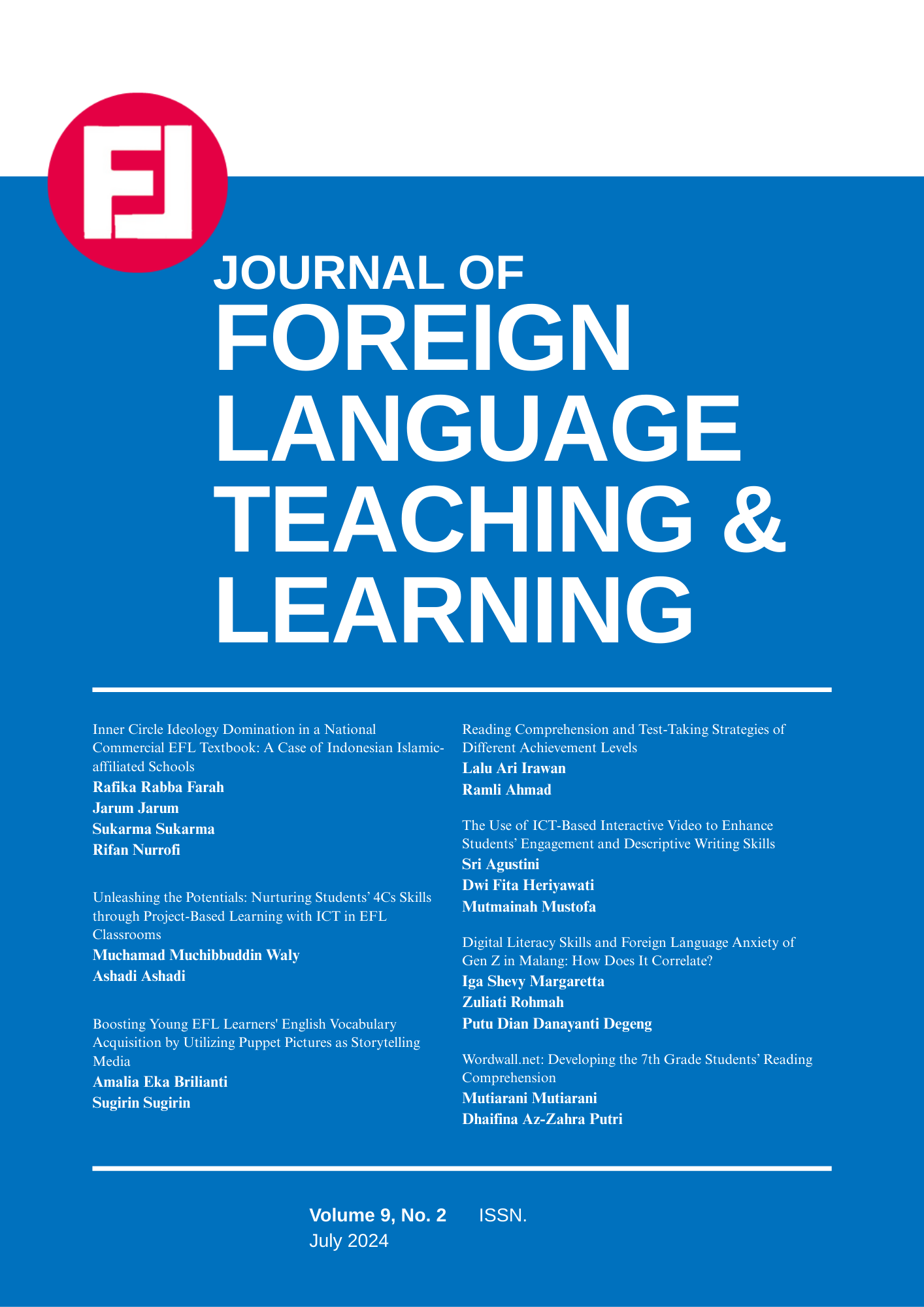Reading Comprehension and Test-Taking Strategies of Different Achievement Levels
DOI:
https://doi.org/10.18196/ftl.v9i2.22663Keywords:
reading comprehension, reading strategy, test taking strategyAbstract
The complexity of the reading process, which poses significant challenges for EFL and ESL learners, underpins this research into effective strategies for both reading comprehension and answering English reading texts. This qualitative phenomenological research aimed to explore the strategies that students use during reading activities and while taking reading comprehension tests. The study involved four fourth-semester students, differentiated by gender and achievement levels: a high-achieving female, a low-achieving female, a high-achieving male, and a low-achieving male. The research identified that students employed a variety of strategies, with 11 metacognitive strategies being used out of a possible 23, including determining word meaning, making connections, inferring, and summarizing. Additionally, four out of the five FIVES reading strategies were utilized: inference, vocabulary, summarization, and experience. High-achieving students employed more strategies, leading to better comprehension and higher test scores. For test-taking, strategies such as careful time management, revisiting difficult questions, and employing process-of-elimination techniques were noted. The effectiveness of both reading and test-taking strategies, along with factors like topic familiarity and the ability to make inferences, were crucial in determining reading success. These findings underscore the importance of targeted interventions that focus on teaching effective strategies, enhancing topic familiarity, and supporting students in developing robust test-taking strategies, particularly for low-achieving students.
References
Abbas, K-D. A. (2021) Factors influencing students reading comprehension difficulties amidst the use of modular distance learning approach in Mindanao State University Sulu – senior high school. Open Access Indonesia Journal of Social Sciences, 4(06), 581-602. https://doi.org/10.37275/oaijss.v4i6
Afdaleni. (2014). Using metacognitive learning strategy to improve reading comprehension. Proceedings of ISELT FBS Universitas Negeri Padang, 2, 40-45. https://ejournal.unp.ac.id/index.php/selt/article/view/6757
Albazi, S., & Shukri, N. (2016). Evaluating the effect of metacognitive strategy training on reading comprehension of female students at KAU. International Journal of Applied Linguistics & English Literature, 5 (3), 173-183. https://doi.org/10.7575/aiac.ijalel.v.5n.3p.172
Assiri, M. S., & Alodhahi, E. A. (2018). Test-taking strategies on reading comprehension tests: A review of major research themes. Studies in English Language Teaching, 6(3), 207-227. https://doi.org/10.22158/selt.v6n3p207
Bouknify, M. (2023). Importance of metacognitive strategies in enhancing reading comprehension skills. Journal of Education in Black Sea Region, 8(2), 41–51. https://doi.org/10.31578/jebs.v8i2.291
Cohen, L., Manion, L., & Morrison, K. (2018). Research methods in education (Eighth edition). Taylor & Francis.
Coiro, J. (2021). Toward a multifaceted heuristic of digital reading to inform assessment, research, practice, and policy. Reading Research Quarterly, 56(1), 9–31. https://doi.org/10.1002/rrq.302
Creswell, J. W., & Creswell, J. D. (2018). Mixed methods procedures. Research design: Qualitative, quantitative, and mixed methods approaches (5th Edition). SAGE.
Gilakjani, A. P., & Sabouri, N. B. (2016). How can students improve their reading comprehension skill? Journal of Studies in Education, 6(2), 229-240. https://doi.org/10.5296/jse.v6i2.9201
Higgs, K. P., Santuzzi, A. M., Gibson, C., Kopatich, R. D., Feller, D. P., & Magliano, J. P. (2023). Relationships between task awareness, comprehension strategies, and literacy outcomes. Frontiers in Psychology, 14(May), 1–15. https://doi.org/10.3389/fpsyg.2023.1056457
Kasim, U., & Raisha, S. (2017). EFL students’ reading comprehension problems: Linguistic and non-linguistic complexities. English Education Journal, 8(03), 308–321. https://jurnal.usk.ac.id/EEJ/article/view/8920
Lailiyah, M., Wediyantoro, P. L., & Yustisia, K. K. (2019). Pre-Reading strategies on reading comprehension of EFL students. EnJourMe (English Journal of Merdeka) : Culture, Language, and Teaching of English, 4(2), 82-87. https://doi.org/10.26905/enjourme.v4i2.3954
Maryansyah, Y., & Ramadhani, P. (2021). The effect of read, cover, remember, and retell (RCRR) strategy on eighth semester students' reading comprehension at English Study Program of Muhammadiyah University of Bengkulu. Teaching English and Language Learning English Journal (TELLE), 01(03), 138–147. https://doi.org/https://doi.org/10.36085/telle.v1i3.2841
Muhid, A., Amalia, E. R., Hilaliyah, H., Budiana, N., & Wajdi, M. B. N. (2020). The effect of metacognitive strategies implementation on students’ reading comprehension achievement. International Journal of Instruction, 13 (02), 847-862. https://doi.org/10.29333/iji.2020.13257a
Miles, M. B., Huberman, A. M., & Saldana, J. (2014). Qualitative data analysis: A methods sourcebook ( 3rd ed.). SAGE.
Muslimah, Z. (2022). The Correlation between students' reading strategies and students' reading comprehension at eleventh grade of Madrasah Aliyah Negeri (MAN) 2 North Lampung Academic Year 2021/2022. Griya Cendikia, 7(2), 859–882. https://doi.org/10.47637/griya-cendikia.v7i2.253
Neubauer, B. E., Witkop, C. T., Varpio, L. (2019). How phenomenology can help us learn from the experiences of others. Perspective on Medical Education, 8(2), 90-97. https://doi.org/10.1007/s40037-019-0509-2
Nurhayati, N., & Nehe, B. (2016). An analysis of students' strategies in answering TOEFL. Journal of English Language Studies, 1(1), 10–18. https://doi.org/10.30870/jels.v1i1.682
Rafi, M. F., & Fatikhul, I. A. (2017). Test taking strategy on students’ reading test. Journal of English Language Teaching, 4(1), 39–48. https://doi.org/10.33394/jo-elt.v4i1.2439
Rafika., & Bakar, M. A. (2020). The effectiveness of using Self-Monitoring Approach to Reading and Thinking (SMART) strategy in reading comprehension of the second grade students of SMP Negeri 8 Langsa. Journal of Linguistics, Literature & Language Teaching, 6(1), 66-88. https://doi.org/10.32505/jl3t.v6i1.1886
Salehi, M. R., & Abbaszadeh, E. (2017). Effects of pre-reading activities on EFL reading by Iranian college students. Linguistics and Literature Studies 5(3), 169-178, https://doi.org/10.13189/lls.2017.050303
Shea, M., & Roberts, N. (2016). FIVES: An integrated strategy for comprehension and vocabulary learning. Journal of Inquiry & Action in Education, 8(1), 95-108. https://digitalcommons.buffalostate.edu/jiae/vol8/iss1/6
Zahra, G. S., Touran, Shemshadsara, Z., Ahour, T., Hadidi Tamjid, N., Hadidi Tamjid, N., Ahour, T., & Nasrin, H. T. (2019). Raising text structure awareness: A strategy of improving EFL undergraduate students’ reading comprehension ability. Cogent Education, 6(1), 1-15. https://doi.org/10.1080/2331186X.2019.1644704
Downloads
Additional Files
Published
How to Cite
Issue
Section
License
Copyright
Authors retain copyright and grant the journal right of first publication with the work simultaneously licensed under a Creative Commons Attribution-ShareAlike 4.0 International License that allows others to share the work with an acknowledgment of initial publication in this journal.
Authors are permitted and encouraged to post their work online (e.g., in institutional repositories, social media account, or on their website) after the article getting published in the journal, as it can lead to productive exchanges and earlier and greater citation of published work (See The Effect of Open Access).License
You are free to:
- Share — copy and redistribute the material in any medium or format
- Adapt — remix, transform, and build upon the material for any purpose, even commercially.
Attribution — You must give appropriate credit, provide a link to the license, and indicate if changes were made. You may do so in any reasonable manner, but not in any way that suggests the licensor endorses you or your use.
ShareAlike — If you remix, transform, or build upon the material, you must distribute your contributions under the same license as the original.
- No additional restrictions — You may not apply legal terms or technological measures that legally restrict others from doing anything the license permits.



.png)





